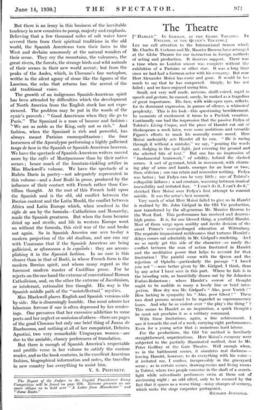The Theatre
[`` HAMLET." IN GERMAN, AT THE GLOBE THEATRE. Ix ENGLISH, AT TilE QUEEN'S THEATRE.] LET me call attention to the International Season which Mr. Charles B. Cochran and Mr. Maurice Browne have arranged at the Globe Theatre for our instruction in foreign methods of acting and production. It deserves support. There was a time when no London season was complete without tees exhibition of a Parisian or other star. It was a long time since we had had a German actor with his company. But now Herr Alexander Moissi has come and gone. It would be ton much to say that he has conquered. Simply, he has not failed ; and we have enjoyed seeing him.
Small, not very well made, nervous, shrill-voiced, rapid in speech and gesture, he cannot, surely, be ranked as a tragedian of great importance. His face, with wide-open eyes, reflects, for its dominant expression, in pauses of silence, a whimsical perplexity. This is his look—this questioning bewilderment. In moments of excitement it turns to a Puckish vexation. Continually one had the impression that the passive Fedya of Tolstoi's Living Corpse, and the piece of Hamlet cut out of Shakespeare a, week later, were some ambitious and versatile Figaro's efforts to mask his normally comic mood. Herr Moissi undeniably acts Hamlet all he can. " He is racing through it without a mistake," we say, " pouring the words out, dodging in the spot light, just covering the ground and the selected bits of text." But one has no impression of " fundamental brainwork," of solidity, behind the slashed scenes. A sort of gymnast, brisk in movement, with charm- ing play of arms and hands, emerges for an hour or two ; then, oblivion ; one can retain and remember nothing. Fedya was better ; but Fedya can be very little ; one of Tolstoi's collapsible failures ; a sad creature, wavering between ironical insensibility and irritated fear. " I can't do it, I can't do it," shrieked Herr Moissi over Fedya's first attempt to commit suicide. It was the actor's best moment.
Very much of what Herr Moissi failed to give us in Maned is realized by Mr. John Gielgud in the Old Vic production, now transferred by the all-generous Mr. Maurice Browne to the West End. This performance has received and deserves high praise. It is, for one blessed thing, a youthful Hamlet. Most of them verge upon senility and invite derision of the sweet Prince's over-prolonged education at Wittenberg. The requisite impassioned recklessness that tortures Hamlet's delays comes out admirably in Mr. Gielgud's rendering. And we so rarely get this side of the character—so rarely the conflict between the man of action frustrated in Hamlet and the meditative power that helps to account for that frustration ! The painful scene with the Queen and the rejection of Ophelia—particularly the passage " I loved you not "—were better given by Mr. Gielgud, I think, than by any actor I have seen in this part. Where he fails is in the brooding vein, so beautifully drawn out by Sir Johnston Forbes-Robertson.: where Hamlet's sorrow of thought ought to be audible in many a lovely line or brief inter- jection. How dry was Mr. Gielgud's " Alas, poor Yorick ! " How lacking in sympathy his " Alas, poor Ghost ! " These two dead persons seemed to be regarded as supernumerary bores. And why be so violent over the play's the thing " This comes to Hamlet as an inspiration, a quick thought : he must not proclaim it as a military command.
With these limitations, again, a fine achievement. 1 saw it towards the end of a week, carrying eight performances. Even for a young actor that is monstrous hard labour.
For the productions, the Old Vic method is familiarly straightforward, unpretentious. Herr Moissi's company were subjected to the partially illuminated method, dear to Mr. Peter Godfrey at the Gate Theatre. Well enough when, as in the battlement scenes, it simulates real darkness— leaving Hamlet, however, to do everything with his voice— it irritated me, I confess, inexpressibly in the graveyard scene ; as in certain scenes, drawing-rooms and living rooms in Tolstoi, where two people converse in the shaft of a search- light while subordinate performers swim at them out of environing night : an odd effect, only to be excused by the fact that it spares us a worse thing—noisy changes of scenery, which make the stage carpenter protagonist.
RICHARD JENNINGS.


































 Previous page
Previous page